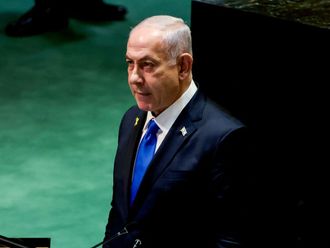Ramallah: The Palestinian Authority announced on Tuesday that it was time to make decisions instead of negotiating at the direct talks between Israel and Palestine.
"The time now is for making decisions, not conducting negotiations and that is why President of the Palestinian National Authority Mahmoud Abbas and the Israeli Prime Minister Netanyahu are personally leading the rounds of talks and meetings to land on an agreement on the core issues including [Occupied] Jerusalem, the borders, the colonies, the refugees, security, water and the prisoners, at a timeline of one year,” said Dr Saeb Erekat, the Chief Palestinian Negotiator.
Dr Erekat was speaking following a series of meetings he held individually with the envoys of the UN Undersecretary, the French Consul, the US consul, the British consul and the Japanese representative at the Palestinian Authority.
"The Israeli Government should make a choice between peace and colony construction, given that the Israeli Government can never have both, and this is a solid stance,” he said.
According to a statement Dr Erekat issued later, he values the extended efforts of the international community in attempting to make the direct negotiations successful.
"The main objective of the relative articles of international law, the UN resolutions, the agreements already signed between the Israelis and the Palestinians, the Roadmap, the statements of the Quartet and the Arab Initiative for peace are ending the Israeli occupation, which started in 1967, and setting up an independent Palestinian state with [Occupied] East Jerusalem as a capital, to live in peace and harmony, side by side with Israel,” he said. “This should be of vital interest for international peace and stability.”
Meanwhile, a senior Fatah official cautioned that the Palestinian National Authority had actually put its existence and legitimacy on the line by participating in the talks, and that the failure to come to a peaceful solution this time round could lead to a new round of violence.
“The real problem lies with the failure to reach a peace agreement or coming up with an unsatisfactory peace deal which the Palestinians will surely refuse,” he said.
The official explained that the current feedback from the Palestinian public is that it’s important to give the negotiations a chance, an attitude which he said was inspired by the US position and its urgency to make peace in the region.
The key mistake the Palestinian National Authority has so far committed, he said, is its failure to inform the Palestinian public of the details of the negotiations and what the desired outcome would be. He stressed that whatever is decided will have a direct impact on the daily lives of the average Palestinian and therefore they should be kept informed of the outcome of the negotiations every step of the way.
He stressed that the Palestinians do not want to repeat their experience with the Oslo Accord, which was agreed in Europe, but implemented in Palestine, adding that this time round whatever decision is reached is likely to be final. He said they’re confused about what has been described as ‘creative solutions’ for the main issues and added that the Palestinian public feel they’re being pressurised by the international community to reach an agreement this time round for economic reasons, at a time when the country is already experiencing a cash crisis.












